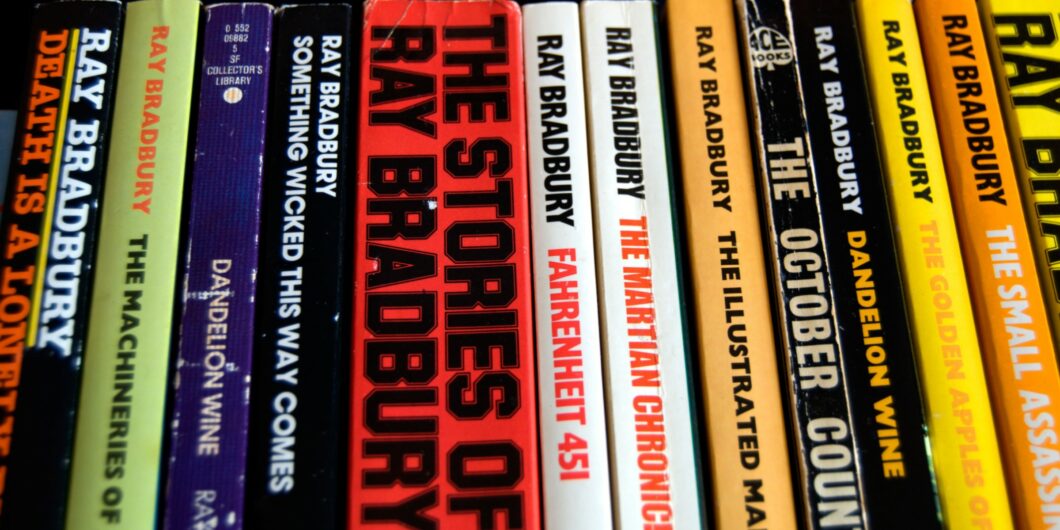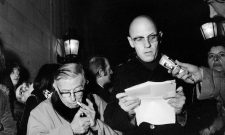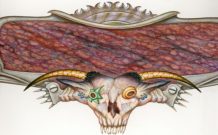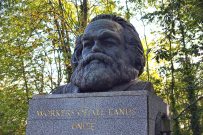My awakened soul has called me to alert my comrades to a number of unacceptably asleep individuals on the left who must be purged.
Imaginative Education
Next year’s going to be even bigger, days will be brighter, nights longer and darker, more people dying, more babies born, and me in the middle of it all.
Ray Bradbury, “Dandelion Wine”
Less than one city block from the Indianapolis campus of the Indiana University School of Medicine, the nation’s largest medical school, sits the Ray Bradbury Center. Do the missions of these institutions have anything to do with one another?
Bradbury, one of the nation’s foremost writers of fantasy, horror, science fiction, and mystery stories, believed deeply in the power of books to engage and enhance the imagination. Of course, he was thinking not of the textbooks or test preparation manuals so heavily relied on at medical and other professional schools but works of literature. He knew that to become fully human, students must become more imaginative, and his writing aimed to expand and deepen the capacity to see the human situation from alternative perspectives.
Too often, education’s liberative potential is not being realized, largely because we are missing out on—or perhaps even intentionally suppressing—opportunities to cultivate the imagination. Think about medical education. Caring well for patients requires not just a large fund of knowledge and battery of skills, but a well-honed moral imagination, the capacity to understand how health and life look to another person. Perhaps most problematic is the contemporary regime of assessment in medical education, with its heavy reliance on multiple-choice tests, which by their very nature engage the moral imagination hardly at all. There is a big difference between selecting the one best response and asking good questions, listening attentively, formulating and testing different hypotheses, and all the while learning about one’s fellow human beings as one goes along.
Bradbury spent his life with books, not because he was a bookworm but because he knew they are the best resources available to expand the human imagination. We can never become another person, but we can imagine how another person sees the world, feels about it, and wishes it would be. Imaginative literature allows us to glimpse the full range of human possibility, to consider how our lives might turn out if we pursued different paths, to ponder how it would feel to give in to and resist various forms of temptation, and what, ultimately, we aspire to contribute through our lives. It is impossible to become a good investigator, whether in the examination room, the laboratory, the classroom, or the boardroom without continually nurturing and developing one’s imagination. We must imagine how life could be different before we can fully appreciate what it is.
Think about perhaps Bradbury’s best-known work, Fahrenheit 451, named after the temperature at which book paper ignites. Superficially about book burning, this 1953 novel imagines a dystopian world in which human imagination has been criminalized. “Schools,” he writes, “are turning out more runners, jumpers, racers, tinkerers, grabbers, snatchers, fliers and swimmers instead of examiners, critics, knowers, and imaginative creators,” and the word “intellectual” has become a “swear word.” To prevent people from discontent, they are molded to consider only one side of a question. The burning of books represents the effort to destroy the human imagination. To this poisonous, dehumanizing vision of human life, Bradbury offers a powerful antidote: “Stuff your eyes with wonder. Live as if you’d drop dead in ten seconds. See the world. It’s more fantastic than any dream made or paid for in factories.”
To understand the implications of our shared vulnerability to disease and injury, the ineluctability of mortality, and the range of ways human beings can respond to them, medical students can turn to no better source than Homer’s Iliad.
Our most valuable resources in medicine are not the budgets by which we too frequently presume to set boundaries on the possible, the physical plants of office buildings and hospitals that would be nothing more than empty shells if patients and those who care for them did not report there, or the sophisticated equipment found in intensive care units and operating rooms. Instead, our most valuable resources are people and the stories they tell, which teach us what we really are, how we fit into the greater scheme of things, and what it means to be truly grateful for it all. Consider these words of Bradbury:
Every so often, late at night, I come downstairs, open one of my books, read a paragraph and say, My God. I sit there and cry because I feel that I’m not responsible for any of this. It’s from God. And I’m so grateful, so, so grateful. The best description of my career as a writer is “at play in the fields of the Lord.” It’s been wonderful fun and I’ll be damned where any of it came from.
Health professions education should focus less on students’ capacities to reproduce countless facts and operations and more on nourishing their imaginations. They must learn not only to extract relevant facts from the patient’s history, physical examination, and laboratory findings, but to imagine themselves in the place of their patients, to glimpse what a disease, injury, or disability means in the larger context of the patient’s life, and above all in situations where hopes for recovery and cure have been exhausted, to give them their full attention and be fully present with them. Bradbury wants us not only to act, fix, and make, but to witness, imagine, and wonder. A career in the health professions is a profound human privilege, a ring-side seat at the human drama, and it would be a terrible waste if students’ capacities to recognize and respond to it languished untapped.
In the field of medicine, what books might best promote this goal? To understand the implications of our shared vulnerability to disease and injury, the ineluctability of mortality, and the range of ways human beings can respond to them, medical students can turn to no better source than Homer’s Iliad. To glimpse what it is like to pass through the gauntlet of mortal illness and the insights it can spawn on how to live, it would be difficult to beat Tolstoy’s The Death of Ivan Ilych. And there are the short stories of physician Anton Chekhov, who kept practicing medicine long after he had become a successful writer, composing such masterpieces as “Longing,” often mistranslated “Misery,” which beautifully explores the human need for someone with whom to share our difficulties and suffering in life, a call that all physicians should be well prepared to answer.
To burn books is to destroy ideas, and to destroy ideas is to miniaturize and superficialize the human mind and heart. Bradbury wants not sterile efficiency but life in full, and he wants it in abundance. In each human being, each patient, and health professional, we find all of life refracted, and our mission as educators is not to simplify and streamline but to welcome and glory in this plenitude, helping health professions education and practice awaken, challenge, and nurture full human beings. Similar imperatives apply in every profession. To learn to be enthused about what is most worthy says far more about imagination than memorization. We must focus less on what is easy to teach and assess and more on what really matters most. In doing our part to foster such a vision of education, we sustain and develop what is ultimately best in humankind.



